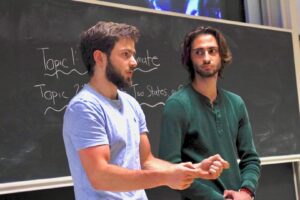
At The University of Texas at Austin, when students register for standard classes like Principles of Chemistry and Western Civilization, they also sign up for courses that fall outside traditional major requirements. Who’s up for Celebrity Culture, Search for Extraterrestrial Life or Really Bad Bugs?
Much like the city it calls home, UT offers something for everyone. Students can pick from more than 1,200 classes offered each semester at 16 colleges and schools. And, with more than 1,100 student organizations, finding a tight-knit group among 50,000 students isn’t too difficult.
Beyond the Expected
Signature Courses
Step Outside the Obvious
While all undergraduates are required to take a Signature Course, the classes offered are anything but standard. Taught by top faculty and designed around contemporary, interdisciplinary content, Signature Courses showcase the university’s gems to new students while teaching them to think, write, speak and solve problems on a college level.
Here are just a handful of the more than 150 Signature Courses available:
- Art, Sport and the Meaning of Life
- Immigration and the American Dream
- Introduction to Music and Film Sound
- Young People and Drugs
- The Power of Giving
- The Good, Bad and Ugly in Chinese Literature

Higher education can sometimes appear to revolve around lofty academic discussions separated from everyday life, but that is becoming less frequent, says Allison Skerrett, an associate professor in The College of Education‘s Department of Curriculum and Instruction, adding that “everyday” subjects such as popular culture and technology deserve as much scholarly attention as the classics.
“These ‘offbeat’ topics emerge from social life, from real conditions and experiences of human beings engaging with their worlds,” says Skerrett, who researches how social and cultural factors influence both teaching and learning. “These topics are real and continue to be significant for people in society. We should want our students to engage with formal knowledge that has been developed around these topics.”
To get in the back-to-school mindset for the start of classes this week, here are some classes you may be surprised to find when scrolling through the course catalog:
(Descriptions are from course catalog. Course availability varies by semester and prerequisites may apply.)
Rhetoric Of Hip-Hop (RHE 309K)
Department of Rhetoric and Writing
In this course we will interrogate the rhetorical power of hip-hop and the specific cultural contexts from which hip-hop springs. We will study the many arguments that hip-hop makes and the various arguments made against hip-hop. In particular, we will focus on the methods by which controversial messages regarding issues such as race and sexuality are performed and disseminated. In this course, students will unpack the rhetorical devices that underlie generation hip-hop’s artistic innovation, dope fashion, fresh beats and sick flows. Ultimately, this course will examine how hip-hop culture has and continues to shape our world views.
Debating the Bible in the 21st Century (RS 346)
Department of Religious Studies
Do not let the course title fool you. “Debating the Bible in the 21st Century” will be neither a Bible study nor a critique on the Bible. Instead, students will analyze the Bible through an academic lens and explore the use of the Bible in the political arena and everyday life. The course will provide a challenge to both the devoted Bible reader and the avid Bible critic alike.

Designing for Human Behavior (ARI 338)
School of Architecture
Issues of mood, privacy, perception, proxemics and preferences applied to the design of interiors.
Creativity and American Culture (ADV 316)
Department of Advertising
A cross-disciplinary view of the creative process and creative products. The conceptual core of film, fine arts, advertising, architecture and literature.
Music Copyright and Publishing (MBU 347M)
Butler School of Music
Recording, music publishing and personal management agreements and how they affect the artist and writer. Includes negotiation considerations, deal points, record company economics and profitability, intellectual property rights, publishing and the control and exploitation of publishing rights in music property, publishing activities, performing rights organizations, catalog sales and acquisitions, publisher and songwriter relations, and royalty accounting.

Tissue Engineering (BME 379)
Department of Biomedical Engineering
Introduction to biomedical research in tissue engineering. Includes case studies of tissues and organs of the body, physiology and biology of tissue, pathologies of tissue, current clinical treatments, the role of engineers in development of new technologies to diagnose and treat pathologies, quantitative cellular and molecular techniques, and applications of synthetic and natural biomaterials.
Lying and Deception (CMS 344K)
Department of Communication Studies
Examines lying and deception as civil, strategic and manipulative behavior. Secrets, privacy, disclosures and confidentiality are examined in a variety of familiar contexts.
The Business of Golf (KIN 365)
Department of Kinesiology and Health Education
Designed for students pursuing a career in the golf business. Includes clubhouse and links management, sales, agronomy, technology and equipment.

Development of a Solar-Powered Vehicle (EE 309S)
Department of Electrical and Computer Engineering
Analysis, design and construction of a solar-powered car for national competitions involving other universities. Study of electrical, mechanical and aerodynamic systems.
Pop Choral Ensemble (ENS 109P)
Butler School of Music
Offered under various topics, including Longhorn Singers and Varsity Singers. Open to any university student who can qualify by audition.
Volcanology (GEO 358K)
Department of Geological Sciences
Ash deposits, lava flows, eruption processes, prediction and mitigation of volcanic hazards.
Competing Visions of the Good Life (CTI 303)
The Thomas Jefferson Center for the Study of Core Texts and Ideas
Introduces the great rival conceptions of the moral basis and goals of political life as elaborated by revolutionary thinkers throughout the history of political philosophy, including Aristotle, Aquinas, Locke, late modern critics of the Enlightenment and others.
National Parks and Protected Areas (GRG 336C)
Department of Geography and the Environment
The history, purpose and meaning of national parks (and preserves, refuges and other publicly protected natural areas), from their inception at Yellowstone in 1872 to their present global distribution. Emphasis is on key management issues and dilemmas in the parks today and the adoption and modification of Western notions of nature preservation within non-Western cultural settings.

Beyond Google (INF 331C)
School of Information
A general introduction to information searching and evaluating information in digital, print, visual and aural formats.
Advanced Business German I (GER 336W)
Department of Germanic Studies
Development of proficiency through readings, discussions and assignments based on materials dealing with the German economic system and Germany’s role in international trade. Emphasis on practical, job-related competence in business German. Taught in German.
Robotics (CS 344R)
Department of Computer Science
A survey of methods and techniques important for intelligent robotics. Students work in teams, applying these methods to get intelligent behavior from physical robots.

Computer-Assisted Drug Design (PHR 493D)
College of Pharmacy
Overview of theory and application of methods useful for computer-assisted drug design, such as molecular orbital calculations, molecular mechanics and dynamics, conformational search, CoMFA, and three-dimensional searching. Hands-on experience with professional-level software and hardware.
Severe and Unusual Weather (GRG 333C)
Department of Geography and the Environment
In-depth discussion of inclement weather phenomena (tornadoes, tropical cyclones, floods, drought) and their effects on human beings, as well as the climatology of those types of weather events.
Fantasy and Reality (PSY 333F)
Department of Psychology
Examination of how children and adults decide what is real and what is not. Topics include the fantasy-reality distinction, magical thinking and religious cognition.
Evolution of Warfare (NS 326)
Department of Naval Science
Explores the forms of warfare employed by great leaders in history as they relate to the evolution of warfare.
Outside the Classroom
Joining a student organization can be just as central to life at UT as which major you choose.
“These groups can cut across racial, cultural, gender, class and other social markers as they prioritize belonging in terms of the shared enterprise,” Skerrett says. “The confidence as a learner, thinker and doer that young people develop from these extracurricular engagements can definitely bolster their learning and performance in more academic spaces.”
Plus, it’s helpful for life after college, she adds.
“Most professional and social enterprises require people to draw from different knowledge and skill sets.”
These 10 student organizations (and the rest of the 1,100 groups on campus) prove that at UT, there’s something for everyone:
Acts of Kindness, or A-OK
What they do: The mission of Acts of Kindness is to uphold the ideal of selflessness by providing its members with opportunities to make a difference to the university campus and the Austin community through service and random acts and kindness.
C.A.K.E. Club, or Canoe and Kayak Everyday
What they do: The C.A.K.E. Club brings students canoeing and kayaking as frequently as possible in Austin, and, naturally, lets friends eat cake together.

American Helicopter Society
What they do: This club provides an outlet for students who wish to build and learn more about helicopters while building skills for the future.
Assault and Flattery
What they do: A tradition begun in 1953, Assault and Flattery is the musical theater company at the University of Texas School of Law.

Electronic Game Developers Society
What they do: The Electronic Game Developers Society gives students opportunities to network with gaming industry insiders and provides a forum for students to learn about game development and developing skills.
Healing Origami
What they do: Healing Origami visits hospitals and helps patients learn to make origami, a form of paper art.

Food Recovery Network, Longhorn Chapter
What they do: This student organization recovers surplus food from restaurants and donates it to food banks and the Salvation Army, including food from O’s Café on campus.
Texas Ice Hockey
What they do: It gets hot in Austin, but the Texas Ice Hockey student organization gives Longhorns the chance to both cheer for hockey players or get on the ice and play the sport.
The Mad Stork Cinema
What they do: The Mad Stork Cinema brings cultural, artistic and political experimental films to the university for students to watch at no cost. These films are typically shot in 16mm and without official distribution, and the group strives to preserve and promote the medium and genre.
Texas SFX
What they do: Texas SFX members practice, learn and discuss special effects makeup and costume design skills and techniques.

Share this story on Twitter:
Rhetoric of Hip-Hop, anyone? Check out 20 courses and 10 clubs you didn't know UT offers: http://t.co/P6EBAVhvQM
— UT Austin (@UTAustin) August 28, 2014



